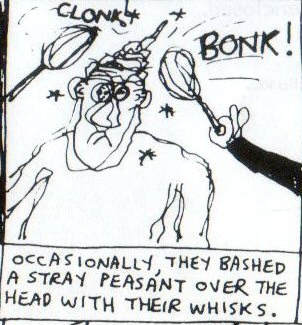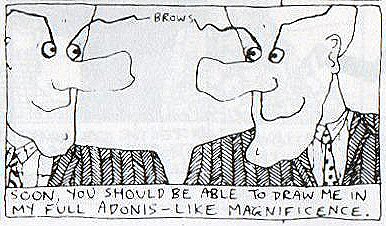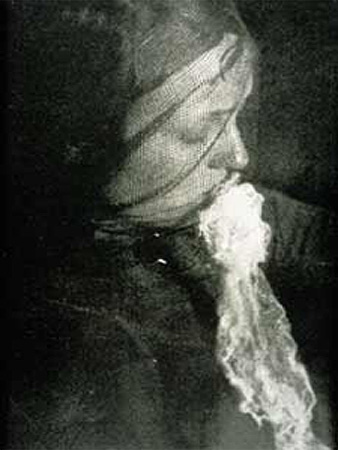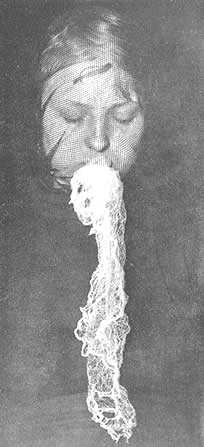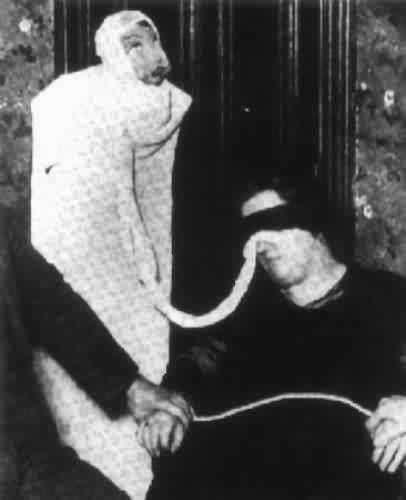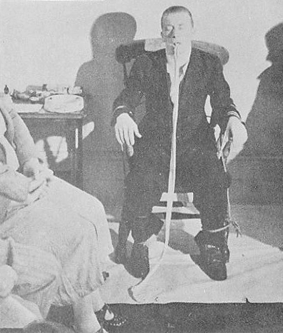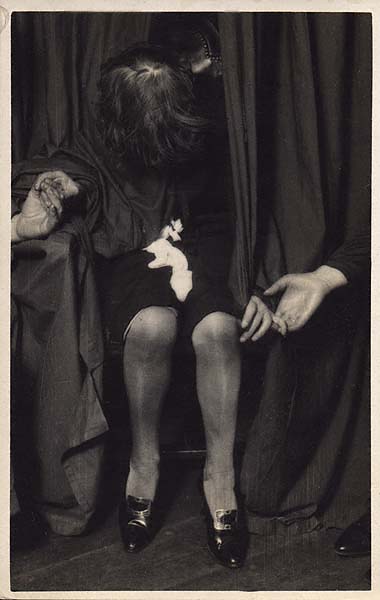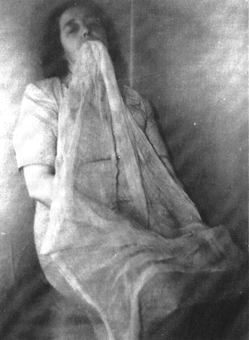In a piece marking the death, at 85, of General Alexander Haig, Christopher Hitchens described the fifty-ninth US Secretary of State as a “slobbering dauphin”. This phrase will be more familiar to Hooting Yard readers as the one commonly used to refer to Prince Fulgencio’s sickly, pipsqueak son and heir, whose official title was His Luminous Magnificence The Princeling Balthazar Clovis Agamemnon De Pig De Pig Of Oogah And Sluice In The Islands Of Widdecombe Sound. That was what it said on his badge. But everybody, including Prince Fulgencio himself, called him the slobbering dauphin, when they were talking about him or, indeed, talking to him.
A typical exchange might go as follows:
Prince Fulgencio : Good grief! Ever since we arrived here at Fort Hoity where I am to review my trooplets and cut a princely dash, you, slobbering dauphin, have been slobbering away and quite taking the shine off my regal jib.
The Princeling : Slobber slobber slobber.
Prince Fulgencio : There, you are at it again! Yes, slobbering dauphin, I am slapping my forehead hard, for you leave me at my wits’ end. Perhaps it is your forehead I ought to be slapping, if I did not think doing so would make you slobber all the more!
The Princeling : Slobber slobber slobber.
Prince Fulgencio : There is only one thing for it! While I remain here at Fort Hoity I must have you out of my sight, so you must go to Fort Toity, a mile or two yonder across the glinka, and stay put. You may take a little groupuscule of henchpersons with you. Now hie thee hence, slobbering dauphin!
Thus is explained the otherwise puzzling fact that the spindly and sickly and slobbering dauphin found himself, that long hot summer, in sole command of Fort Toity. Freed from the repressive influence of his loathsome Papa, the Princeling’s slobberings grew fewer, and on some days he barely slobbered at all. Though there was, at Fort Toity as at Fort Hoity, a full complement of domestic staff, he spent much of his time in the first few days buffing the crenellations with a rag, until they glistened. When this activity exhausted his weedy constitution, the Princeling sprawled pallid and wan upon cushions, on a balcony, gazing for hours at the desolate glinka, with its few scattered clumps of lightning-blasted shrubbery and, dotted here and there, yawning pits of doom into which would topple, from time to time, such small blind stupid furry creatures as had strayed from their nestings and burrows in search of food. The sun was immense, and golden.
In his paperback potted biography of the Princeling, Pebblehead is at pains to point out that the slobbering dauphin’s balcony cushions were uncomfortable, and thus that his lolling upon them for untold hours was a kind of penitence. But penitence for what? Pebblehead does not say, at least not explicitly. At the time of the Fort Toity summer, the Princeling was but a pipsqueak youth, and had not the years behind him to have drummed up the kind of catalogue of crimes other writers have imputed to him, confusing him perhaps with his black-hearted father, or even perhaps with the deranged killer Babinsky, to whom, in later life, when he had grown an impressive walrus moustache, the Princeling bore more than a passing resemblance. Indeed, it became a tactic of Babinsky’s, whenever the coppers were closing in on him, to slobber, the better to outwit them. Certainly we have not one whit of evidence that the slobbering dauphin was involved in the series of outrages that took place in and around the glinka in the months before he was installed at Fort Toity. In any case, even had he harboured a desire to wipe out great swathes of peasantry, how likely is it that he would have crept about from place to place poisoning wells, when all he need do, as Princeling, was to drop a word in his father’s ear? Prince Fulgencio was always looking for any excuse to issue a ukase to his henchpersons and to have them clattering about the place on their fine ferocious horses bringing death and ruination in their wake. That was the kind of Prince he was, those the kind of henchpersons.
It is possible that Pebblehead mistranslated the ancient documents, getting “uncomfortable cushions” where he ought to have had “gorgeous embroidered pillows stuffed with duck down and a new kind of foam material soft as marshmallow”. The Princeling’s own jottings give no sense that he was consumed by guilt and the desire for uncomfortable cushion penitence, though they are difficult to read, because his slobbering was always at its most slobbery when he was writing, even during that blazing Fort Toity summer, when he slobbered less in general.
There was an amusing fashion, for a brief period in the latter half of the last century, for wealthy beat music combos to decamp to chateaux, there to engage in the dual activities of high debauch and the waxing of their latest disc. As we know full well, there is nothing new under the sun, that immense and golden orb that beat down, once, upon the desolate glinka and upon the balcony where the slobbering dauphin sprawled upon his cushions. And one blazing noon, his brain grown hot, the Princeling had a sudden thought, and clapped his hands to summon a henchperson.
The Princeling : Today I am able to stop slobbering long enough to speak coherently, Arpad. [For the henchperson’s name was Arpad.] My brain is hot, and I have a sudden thought. I want you to go bustling about the villages on the edges of the glinka and round up some musicians. Players on the sackbut and shawm and pipe and drum and what have you. Bring them to me, at once!
Arpad : It will be enacted, O slobbering dauphin.
Arpad the henchperson was a frighteningly efficient fellow, and no sooner had he been given his orders than he was off, on a cart drawn by several horses borrowed from Prince Fulgencio’s magnificent horsery at Fort Hoity. As Pebblehead pointed out, for all his evil ways, Prince Fulgencio had done much to eradicate sickness among his steeds, and the Fort Hoity horsery proudly proclaimed itself to be free of glanders, headshaking, lethal white syndrome, mud fever, contagious equine metritis, rainscald, strangles, quiltor, hereditary equine regional dermal asthenia, choke, grass sickness, recurrent airway obstruction, cerebellar abiotrophy, lavender foal syndrome, pythiosis, poll evil, and many another common horse disease. So healthy and vigorous were the horses pulling his cart that Arpad made the rounds of the villages in a single afternoon, and returned to Fort Toity at dusk with various sackbuttists and shawmists and pipers and drummers, to the unbridled delight of the Princeling, who cut some capers and slobbered, and rewarded Arpad with a personal picnic basket.
So happy was the Princeling that his slobbering became uncontrollable, and he had to write down his instructions for the musicians, with Arpad at his side mopping the slobber into a cup so it did not drip upon the vellum. Although the original is lost, Pebblehead was able to reconstruct the Princeling’s scribble using the technique known as “boggle-eyed hallucinatory scribble reconstruction”, sitting in a darkened room kept at a constant chill, and with beetles scurrying across the floor. The bestselling paperbackist actually wrote two entirely different versions, because he was enjoying himself so much, but only one is suitable for family reading. According to Pebblehead, this is what the slobbering dauphin wrote:
While I was buffing the crenellations with a rag, and more so when I was just lying sprawled on cushions on the balcony gazing upon the desolation of the glinka, all the while I have been hearing noises in my head. Noises, I say? No, music, the music of the spheres, or at least between my ears. Now, I charge you raggle-taggle band of players to make this music known to the world outside my head, so others, including Arpad here, and the other henchpersons, and my father’s majestic horses, and the domestic staff, and all who dwell in Fort Toity, and beyond, beyond the glinka, in the villages from whence you came, and elsewhere, may hear it. For it is music destined to be immortal. It will outlast me, as it will outlast my terrible reproachful father, Prince Fulgencio, as it will outlast even you, who play it. For I command also Arpad, with or without the help of his fellow henchpersons, to devise, from polished magnetic pebbles and pointy bits of tin and interlocking wheels and belts made from the stretchy sinewy guts of badgers and the like, an engine to entrap and then to recreate this music, over and over again, so you need no longer play it and may begone from Fort Toity and return to your villages. So, begin to play upon your sackbuts and shawms and pipes and drums, and I will direct and guide you by gesticulation of my arms and legs and movements of my brow, and by slobbering.
The music thus created, by fits and starts and with much agon, sounded remarkably like the genre we know today as “smooth death metal”. Before summer’s end, it was blasted by Arpad’s engine across the glinka, from dawn to dusk, occasionally jaunty, sometimes pounding, but mostly just smooth and deathly and metallic, just as the slobbering dauphin heard it inside his head.
But the summer ended, as summers will, and one morning Prince Fulgencio came to Fort Toity, roaring his head off, on horseback, flanked by a trooplet of brutish henchpersons.
Prince Fulgencio : Well, slobbering dauphin, I have shut up Fort Hoity for the bleaker months, and am set upon a long and arduous journey to Castle Blunkett, there to hole up for the winter tormenting the peasantry and eradicating disease among the horses and guide dogs. I wish you to accompany me, for so vast is the castle that you can have your own wing to slobber in, slobber as you will.
The Princeling : Slobber slobber slobber.
Then came a wind such as swept across the glinka on autumnal mornings, a bitter wind. Arpad helped the weedy Princeling up on to a horse, and off he rode, slobbering onto the horse’s magnificent shining mane, riding into the wind.

